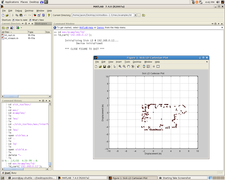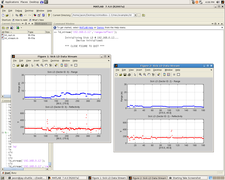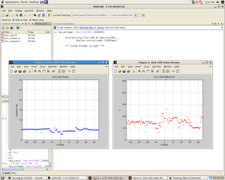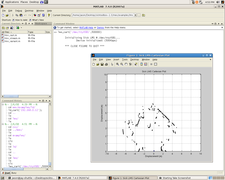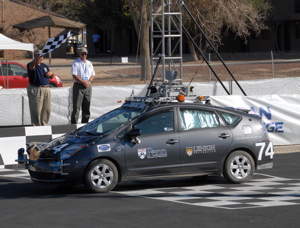
Project Overview

The Sick LIDAR Matlab/C++ Toolbox is an open-source software package released under a BSD Open-Source License that provides stable and easy-to-use C++ drivers for Sick LMS 2xx and Sick LD laser range finders. In addition to low-level drivers, the package also features an easy to use Mex interface, which allows the end-user to stream real-time range and reflectivity data directly into Matlab. This feature is especially attractive as it facilitates the rapid development of algorithms by exploiting the high-level functionality afforded by Matlab's vector-based operations. The toolbox is branched from the source code used by the Ben Franklin Racing Team during the DARPA Urban Challenge. The team was formed through a collaboration lead by the University of Pennsylvania with partners Lehigh University and Lockheed Martin. The team's fully-autonomous entry — Little Ben — employed five Sick LMS 291 and LD-LRS LIDARs during the race, and was one of only six vehicles to successfully complete the 57 mile Urban Challenge Final Event.
News
- 11 Nov 2010 - The Sick Toolbox has cleared 3,000 downloads!
- 2 Jul 2010 - sicktoolbox-1.0.1 released! (A minor release that fixes a few bugs and supports compilation with new versions of gcc!)
- 10 Jan 2010 - We are very excited to announce that The Sick LIDAR Matlab/C++ Toolbox has been integrated into the Robot Operating System. ROS is being developed by Willow Garage. Click here for more information!
- 31 May 2009 - The Sick Toolbox has cleared over 1,600 downloads! Thanks everyone for your interest and support!
- 22 Jan 2009 - The Sick LIDAR Matlab/C++ Toolbox has moved to the GRASP Laboratory at the University of Pennsylvania!
- 18 Mar 2008 - sicktoolbox-1.0 released!
Download the Toolbox
- Download the latest release of the Sick LIDAR Matlab/C++ Toolbox from here.
- Checkout the latest SVN snapshot anonymously via your command line as follows:
svn co https://sicktoolbox.svn.sourceforge.net/svnroot/sicktoolbox
Toolbox Features
- Multi-threaded Sick LMS 2xx C++ driver (RS-232/422)
- Data Acquisition: Acquire raw range and/or reflectivity returns, mean measured values, interlaced scans, and more...
- Configure: Set variant (field-of-view and scan resolution), measuring units, measuring mode, availability level, and more...
- Multi-threaded Sick LD C++ driver (TCP/IP via BSD Sockets)
- Data Acquisition: Acquire raw range and reflectivity values from multiple scan sectors
- Configure: Set Sick LD sector configuration including field-of-view and scan resolution
- Matlab Mex interface for acquiring data via both drivers
- Designed for use under Linux/Unix systems using GNU Autotools
- Plenty of C++ and Matlab example code
Screenshots
Authors
The Sick LIDAR Matlab/C++ Toolbox is currently maintained by Jason Derenick of the GRASP Laboratory at the University of Pennsylvania. The toolbox was originally developed by Jason Derenick and Thomas Miller at Lehigh University as members of the Vision, Assistive Devices, and Experimental Robotics (VADER) Laboratory in the Department of Computer Science and Engineering.
Acknowledgments
We'd like to thank our teammates on the Ben Franklin Racing Team who also contributed to the development of this toolbox, to include Aleksandr Kushleyev, Tully Foote, Jon Bohren, Alex Stewart, Brian Satterfield, Professor Daniel Lee and Professor John Spletzer.
This work was funded in part by Thales Communications, Inc., the Commonwealth of Pennsylvania, Department of Community and Economic Development, and by the National Science Foundation Partnerships for Innovation (PFI) Program under Grant No. 0650115. Any opinions, findings, and conclusions or recommendations expressed in this material are those of the author(s) and do not necessarily reflect the views of the National Science Foundation.
Contact
Feature requests and bug reports should be submitted using the project's Sourceforge tracker system.
You can also send inquiries to: jasonder (at) seas (dot) upenn (dot) edu.
